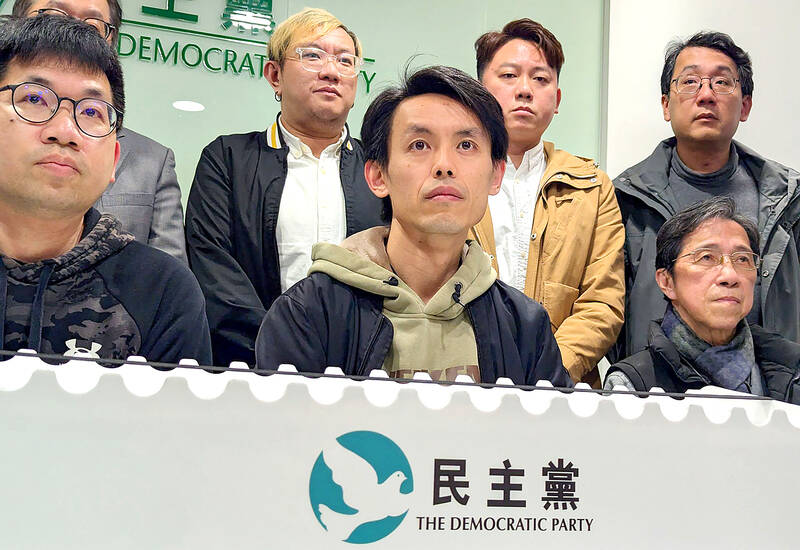A 30-year-old Hong Kong political party that used to lead the territory’s pro-democracy camp before Beijing cracked down on dissent is starting preparations to shut down, its leader said on Thursday.
“We are going to proceed and study on the process and procedure that is needed for the disbanding,” Democratic Party chairman Lo Kin-hei (羅健熙) said.
Lo said the final decision to dissolve the party must be left to a members’ vote, without saying when that would take place.

Photo: AFP
“We considered the overall political environment in Hong Kong and all those future plans that we can foresee, and that is the decision that we make,” Lo told reporters.
The Democratic Party was founded in 1994, near the end of British colonial rule, when Hong Kong’s leading liberal groups merged.
Early leaders of the Democratic Party played a key role in shaping the “one country, two systems” formula, a constitutional arrangement that promised Hong Kong a high degree of autonomy and rights protections.
After the territory was handed over to China in 1997, the party became the most influential voice of opposition in the Hong Kong Legislative Council and led peaceful street demonstrations, but the party’s fortunes declined after Beijing tightened its grip and imposed a national security law, following huge and often violent pro-democracy protests in 2019.
“Developing democracy in Hong Kong is always difficult,” Lo said on Thursday. “We see a lot of civil society groups or political parties disbanding.”
Asked whether the party had been pressured by Beijing to fold, Lo said he would not disclose details of internal discussions.
Four of the party’s former lawmakers — including former Democratic Party chairman Wu Chi-wai (胡志偉) — are serving prison sentences after being found guilty of subversion under the national security law last year.
The party no longer holds any legislative seats after Hong Kong revamped its electoral system in 2021 to ensure only “patriots” can take office.
A three-person task force that includes Lo is to study the legal and accounting rules on party dissolution.
The party has 400 members and is not experiencing acute financial stress, Lo said.
A vote to dissolve the party would require the support of 75 percent of meeting participants.
Lo said he hoped Hong Kong can return to values such as “diversity, inclusion and democracy” that underpinned its past success.
Well-known figures from the party include Martin Lee (李柱銘) — hailed by some as Hong Kong’s “Father of Democracy” — as well as Albert Ho (何俊仁), who organized annual vigils to mark the 1989 Tiananmen Square crackdown.
Hong Kong’s second-largest opposition group, the Civic Party, dissolved in 2023.

Seventy percent of middle and elementary schools now conduct English classes entirely in English, the Ministry of Education said, as it encourages schools nationwide to adopt this practice Minister of Education (MOE) Cheng Ying-yao (鄭英耀) is scheduled to present a report on the government’s bilingual education policy to the Legislative Yuan’s Education and Culture Committee today. The report would outline strategies aimed at expanding access to education, reducing regional disparities and improving talent cultivation. Implementation of bilingual education policies has varied across local governments, occasionally drawing public criticism. For example, some schools have required teachers of non-English subjects to pass English proficiency

‘FORM OF PROTEST’: The German Institute Taipei said it was ‘shocked’ to see Nazi symbolism used in connection with political aims as it condemned the incident Sung Chien-liang (宋建樑), who led efforts to recall Democratic Progressive Party (DPP) Legislator Lee Kun-cheng (李坤城), was released on bail of NT$80,000 yesterday amid an outcry over a Nazi armband he wore to questioning the night before. Sung arrived at the New Taipei City District Prosecutors’ Office for questioning in a recall petition forgery case on Tuesday night wearing a red armband bearing a swastika, carrying a copy of Adolf Hitler’s Mein Kampf and giving a Nazi salute. Sung left the building at 1:15am without the armband and apparently covering the book with a coat. This is a serious international scandal and Chinese

TRADE: The premier pledged safeguards on ‘Made in Taiwan’ labeling, anti-dumping measures and stricter export controls to strengthen its position in trade talks Products labeled “made in Taiwan” must be genuinely made in Taiwan, Premier Cho Jung-tai (卓榮泰) said yesterday, vowing to enforce strict safeguards against “origin laundering” and initiate anti-dumping investigations to prevent China dumping its products in Taiwan. Cho made the remarks in a discussion session with representatives from industries in Kaohsiung. In response to the US government’s recent announcement of “reciprocal” tariffs on its trading partners, President William Lai (賴清德) and Cho last week began a series of consultations with industry leaders nationwide to gather feedback and address concerns. Taiwanese and US officials held a videoconference on Friday evening to discuss the

PERSONAL DATA: The implicated KMT members allegedly compiled their petitions by copying names from party lists without the consent of the people concerned Judicial authorities searched six locations yesterday and questioned six people, including one elderly Chinese Nationalist Party (KMT) member and five KMT Youth League associates, about alleged signature forgery and fraud relating to their recall efforts against two Democratic Progressive Party (DPP) legislators. After launching a probe into alleged signature forgery and related fraud in the KMT’s recall effort, prosecutors received a number of complaints, including about one petition that had 1,748 signatures of voters whose family members said they had already passed away, and also voters who said they did not approve the use of their name, Taipei Deputy Chief Prosecutor